soldiers
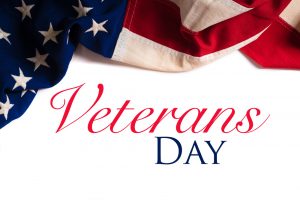 Our Veterans…the cream of the crop. The strong and the brave. Those ones, with courage to last for days. We really cannot say enough about our brave fighting mem and women, who are willing to give up time with family and friends, to go out and fight, sometimes giving their lives so that other people…often unknown to them can live free. There should be a day to honor them. How could we not have such a day? It would be unthinkable. And so, today, we honor them. Those who served and came home again…some to face disability, PTSD, and sadness over the ones who didn’t make it home. We honor them, because they did what we were unable to do. While we sit at home, hopefully praying for our fighting men and women, they bravely took to the battleground, in the air, on land, and sea. Yes, not all served in wartime, but at any moment, all of them knew that it could become wartime.
Our Veterans…the cream of the crop. The strong and the brave. Those ones, with courage to last for days. We really cannot say enough about our brave fighting mem and women, who are willing to give up time with family and friends, to go out and fight, sometimes giving their lives so that other people…often unknown to them can live free. There should be a day to honor them. How could we not have such a day? It would be unthinkable. And so, today, we honor them. Those who served and came home again…some to face disability, PTSD, and sadness over the ones who didn’t make it home. We honor them, because they did what we were unable to do. While we sit at home, hopefully praying for our fighting men and women, they bravely took to the battleground, in the air, on land, and sea. Yes, not all served in wartime, but at any moment, all of them knew that it could become wartime.
I can’t say what it is that makes a soldier, because each probably has their own reasons for enlisting, but 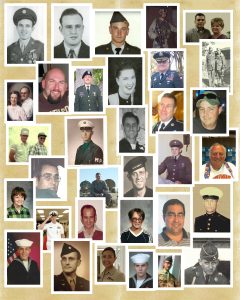 before they become a soldier, each has to make a decision that they will serve their country and willingly go wherever they are told, often without having a say in the matter. Some assignments are great, taking the soldier and family to exotic places, but some are so dangerous that the soldier cannot take his/her family along because it would be unsafe for them. Still, dangerous or not, the soldier bravely goes, and tries to be a credit to his/her uniform.
before they become a soldier, each has to make a decision that they will serve their country and willingly go wherever they are told, often without having a say in the matter. Some assignments are great, taking the soldier and family to exotic places, but some are so dangerous that the soldier cannot take his/her family along because it would be unsafe for them. Still, dangerous or not, the soldier bravely goes, and tries to be a credit to his/her uniform.
I am very proud of our veterans. They have served this country proudly. They took orders when they knew it could mean they lose their lives. That is a rare thing these days, when civil unrest is the norm. Many people would never consider a life or even an enlistment period, because they don’t think they would be appreciated. They don’t want to risk coming home only to be vilified, when in reality, they are the heroes. Veterans Day is a day to celebrate the soldiers who faced it all, and came back home to their families. To all of you…thank you for your service, and Happy Veterans Day!!
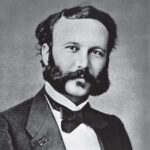
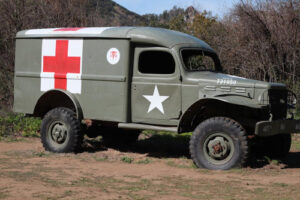 When it became necessary to improve the condition of the wounded soldiers during a war, 12 nations adopted The Geneva Convention of 1864 for the Amelioration of the Condition of the Wounded and Sick of Armies in the Field during a meeting in Geneva. Basically, the agreement, which had been advocated by Swiss humanitarian Jean-Henri Dunant, provided for the neutrality of medical personnel, so they could provide care to the sick and wounded in times of war, without considering the nation the soldier came from. It’s hard for me to think of refusing a soldier care because he fought for the enemy. He is still a human being, and still needs care. Nevertheless, there were times when the medics were not allowed to care for enemy troops.
When it became necessary to improve the condition of the wounded soldiers during a war, 12 nations adopted The Geneva Convention of 1864 for the Amelioration of the Condition of the Wounded and Sick of Armies in the Field during a meeting in Geneva. Basically, the agreement, which had been advocated by Swiss humanitarian Jean-Henri Dunant, provided for the neutrality of medical personnel, so they could provide care to the sick and wounded in times of war, without considering the nation the soldier came from. It’s hard for me to think of refusing a soldier care because he fought for the enemy. He is still a human being, and still needs care. Nevertheless, there were times when the medics were not allowed to care for enemy troops.
When the proposal was adopted, is was necessary to design an international emblem to mark medical personnel and supplies. In honor of Dunant’s nationality, a red cross on a white background…the Swiss flag in reverse…was chosen. Most of us have seen it, in person or on television. The MASH units had the symbol on the top of their tents. Military ambulances had it on the top of the unit. The organization became known as the International Committee of the Red Cross. Of course, we know it as the Red Cross. After a time many nations formed their own branches of the Red Cross.
Clara Barton founded the American chapter after hearing about the Red Cross in Geneva, Switzerland. In 1869. Barton went to Europe and became involved in the work of the International Red Cross during the Franco-Prussian War. After the war, she was determined to bring the organization to America. Barton became President of the American branch of the society, known as the American National Red Cross in May 1881 in Washington. Barton had connections in New York, so she opened the first chapters there. Money was donated by John D Rockefeller and four others to help create a national headquarters near the White House. Frederick Douglass, the abolitionist and a friend of Barton’s, offered advice and support as she sought to establish the American Chapter of Red Cross. As Register of Deeds for the District of Columbia, Douglass also signed the American Red 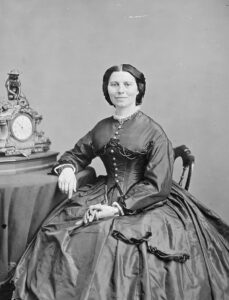
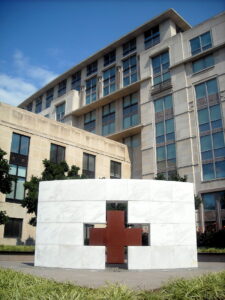 Cross’ original Articles of Incorporation.
Cross’ original Articles of Incorporation.
Barton led one of the group’s first major relief efforts, a response to the 1881 Thumb Fire in Michigan’s Thumb region. Over 5,000 people were left homeless. The next major disaster was the Johnstown Flood on May 31, 1889. Over 2,209 people died and thousands more were injured in or near Johnstown, Pennsylvania, in one of the worst disasters in US history. The American National Red Cross, became an organization that was highly respected. Over the years they have done much to provide humanitarian aid to victims of wars and natural disasters in congruence with the International Red Cross. In 1901, Jean-Henri Dunant was awarded the first Nobel Peace Prize.
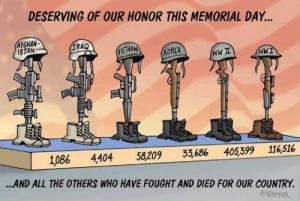 So many military holidays are mixed up and celebrated in a wrong manner, or simply forgotten and celebrated as a fun holiday whereby we are off work. Memorial Day is celebrated as the beginning of summer, usually with picnics and other fun events, but the reality is that Memorial Day is the day we honor, or should honor, those soldiers who fought in a war, and did not return home. They gave their all…their lives. We can never repay such a debt to the brave men and women who fought and died so that we and other nations might live free.
So many military holidays are mixed up and celebrated in a wrong manner, or simply forgotten and celebrated as a fun holiday whereby we are off work. Memorial Day is celebrated as the beginning of summer, usually with picnics and other fun events, but the reality is that Memorial Day is the day we honor, or should honor, those soldiers who fought in a war, and did not return home. They gave their all…their lives. We can never repay such a debt to the brave men and women who fought and died so that we and other nations might live free.
I didn’t personally lose a loved one in any war, but I know a few people who 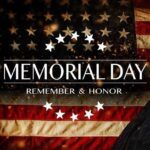 did, and my heart goes out to them on this day. The families of these brave soldiers who gave their lives, sacrificed too, and their sacrifice is no small one. I know that in my family, there were men who lost their lives in war. I just didn’t know them personally. I doubt if any family can be totally free of that loss, given all the wars there have been throughout history.
did, and my heart goes out to them on this day. The families of these brave soldiers who gave their lives, sacrificed too, and their sacrifice is no small one. I know that in my family, there were men who lost their lives in war. I just didn’t know them personally. I doubt if any family can be totally free of that loss, given all the wars there have been throughout history.
Memorial Day is so important, because without the sacrifice these men and women made, our world would be a totally different place today. Many of us have cringed at 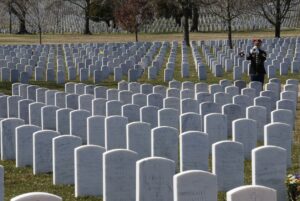 the changes that the current administration is trying to bring on this nation. I feels like an insult to the brave mn and women who fought and died for our freedom. Today is not a day to barbeque and celebrate the long weekend. In reality, it is a day to reflect on those we have lost in the horrible wars we have had to fight to keep this nation and others free. As you go about your day, please try to remember that fact, and thank a lost soldier’s family is you know one. We owe them and their lost soldier a great debt of gratitude. To anyone who has lost a loved one in battle, I say, “thank you for your sacrifice and that of your loved one.” It will never be forgotten.
the changes that the current administration is trying to bring on this nation. I feels like an insult to the brave mn and women who fought and died for our freedom. Today is not a day to barbeque and celebrate the long weekend. In reality, it is a day to reflect on those we have lost in the horrible wars we have had to fight to keep this nation and others free. As you go about your day, please try to remember that fact, and thank a lost soldier’s family is you know one. We owe them and their lost soldier a great debt of gratitude. To anyone who has lost a loved one in battle, I say, “thank you for your sacrifice and that of your loved one.” It will never be forgotten.
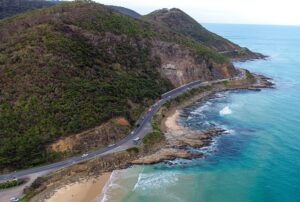
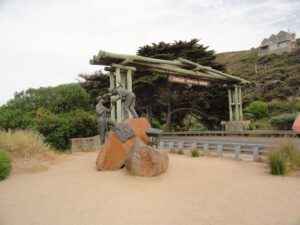 There are many trails or roads that stretch across this world that seem to be simply a way to get from point A to point B, and indeed, that is what many of them are, but there are some that hold a very different meaning. One such road is the Great Ocean Road in southern Australia. The Great Ocean Road is an Australian National Heritage listed 151 mile stretch of road along the south-eastern coast of Australia between the Victorian cities of Torquay and Allansford. The road was built by soldiers who had returned from war between 1919 and 1932 and dedicated to soldiers killed during World War I. The Great Ocean Road is the world’s largest war memorial. It is an interesting kind of memorial, winding through varying terrain along the coast and providing access to several prominent landmarks, including the Twelve Apostles limestone stack formations. The road is an important tourist attraction in the region.
There are many trails or roads that stretch across this world that seem to be simply a way to get from point A to point B, and indeed, that is what many of them are, but there are some that hold a very different meaning. One such road is the Great Ocean Road in southern Australia. The Great Ocean Road is an Australian National Heritage listed 151 mile stretch of road along the south-eastern coast of Australia between the Victorian cities of Torquay and Allansford. The road was built by soldiers who had returned from war between 1919 and 1932 and dedicated to soldiers killed during World War I. The Great Ocean Road is the world’s largest war memorial. It is an interesting kind of memorial, winding through varying terrain along the coast and providing access to several prominent landmarks, including the Twelve Apostles limestone stack formations. The road is an important tourist attraction in the region.
The road would likely have been a huge tourist attraction, without the memorial as part of the attraction. I has gorgeous views of the ocean, as well as lighthouses along the way. It can be driven the entire way, but there are trails to walk along it as well, which would really be the thing I would find interesting. Along the way you can see limestone formations like the Twelve Apostles, but also one called the London Arch. It used to be the London Bridge, so I wonder if it was connected to the land at one time. The area has also been well known for shipwrecks, in fact, it is called the Shipwreck Coast. Ships wrecked there include Thistle (1837), Children (1839), Unknown French whaler (1841), Lydia (1843), Socrates (1843), Cataraqui (1845), Enterprise (1850), Essington (1852), Freedom (1853), SS Schomberg (built Liverpool, named after Charles Frederick Schomberg, sunk 1855), John Scott (1858), Golden Spring (1863), Marie Gabrielle (1869), Young Australian (1877), Loch Ard (1878), Napier (1878), Alexandra (1882), Yarra (1882), Edinburgh Castle (1888), Fiji (1891), Joseph H. Scammell (1891), Newfield (1892), Freetrader (1894), La Bella (1905), Falls of Halladale (1908), The Speculant (1911), Antares (1914), Casino (1932), and City of Rayville (1940), among others. Over 50 shipwrecks are commemorated in a Historic Shipwreck Trail beginning at Port Fairy.
There are a number of tourist attractions along the Great Ocean Road, besides the Shipwreck Coast west of Cape Otway, including the Surf Coast, between Torquay and Cape Otway, providing visibility of Bass Strait and the Southern Ocean. The road winds through rainforests, as well as beaches and cliffs made of limestone and 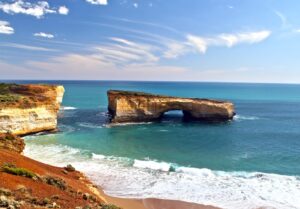
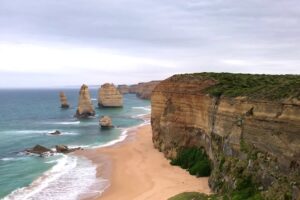 sandstone, which is susceptible to erosion…hence the limestone stacks. As the Great Ocean Road nears Geelong, the road moves along the coast, with tall, almost-vertical cliffs on the other side of it. Of course, there is the possibility of falling rocks, but it doesn’t deter the tourists. I have never had the pleasure of being a tourist along that beautiful stretch of road, but I really think I might enjoy it if I ever got the chance.
sandstone, which is susceptible to erosion…hence the limestone stacks. As the Great Ocean Road nears Geelong, the road moves along the coast, with tall, almost-vertical cliffs on the other side of it. Of course, there is the possibility of falling rocks, but it doesn’t deter the tourists. I have never had the pleasure of being a tourist along that beautiful stretch of road, but I really think I might enjoy it if I ever got the chance.
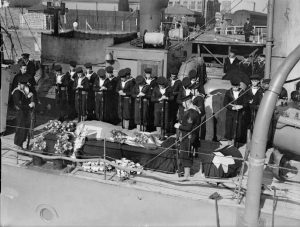
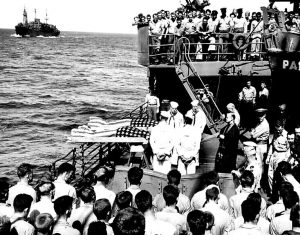 Most of us really don’t want to think about our own funeral, but when men are at war, death and a funeral become a subject they have to think about. They don’t want to, but they have no guarantee that they will return home, so they are faced with the possibility of death every day. In the Navy, during wartime, at least in the past, if not currently, it was common practice to bury the casualties at sea. That is such a hard concept for me, and yet there isn’t really anything wrong with it. I guess that having no grave site to visit is probably the thing that is bothering me the most. It’s not that I spend days and hours at the cemetery, but rather that I know exactly where my loved ones are laid to rest, or where I will be.
Most of us really don’t want to think about our own funeral, but when men are at war, death and a funeral become a subject they have to think about. They don’t want to, but they have no guarantee that they will return home, so they are faced with the possibility of death every day. In the Navy, during wartime, at least in the past, if not currently, it was common practice to bury the casualties at sea. That is such a hard concept for me, and yet there isn’t really anything wrong with it. I guess that having no grave site to visit is probably the thing that is bothering me the most. It’s not that I spend days and hours at the cemetery, but rather that I know exactly where my loved ones are laid to rest, or where I will be.
Burials at sea have been going on as long as men have been going to sea. For logical reasons, a body could not be kept on board a ship for the remainder of the cruise, so the death had to be dealt with. In early days, the body was wrapped in a shroud, usually made of sailcloth, but later caskets were also used. If the family has decided to use a casket instead of a shroud for the burial at sea, the casket must be a metal casket, because it must be able to deteriorate in the marine environment. I suppose that makes sense, because eventually ships and planes return to the environment around them. The sea eventually claims what doesn’t belong there naturally. Of course, the timeframe involved in the deterioration of the casket would be well beyond the lifetime of the families, so I guess that would make it easier to think about it.
Military burials at sea are performed with much pomp and circumstance. The honor of the soldier is held in the highest regard. The personnel who participate or even attend the services must wear the Uniform of the Day. The commanding officer tries to have a chaplain of the appropriate faith perform the ceremony, but if that is not an option, the service may be read by the commanding officer or an officer designated by him/her. The service is much like a church service, with a eulogy, firing squad salute, pall bearers, and a flag ceremony. When everything is finished, the body is moved to the side of the ship of a plank and then the plank is raised so that the casket or shrouded body slides off into the sea.
Of course, when a ship sinks, there is an instant burial at sea for all who do not survive. Many times the ship is not found for years, so the ship becomes the casket for all those who lost their lives. The family can seek to have the body recovered when the ship is found, but often that does not happen. The USS Arizona is probably 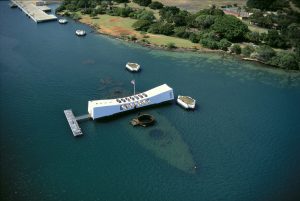
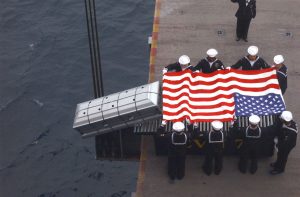 one of the most well known casket ships in the world, and while it was easy to see and get to, many of the families chose to leave their loved ones there. The USS Arizona went down with 1,177 Sailor and Marines on board. The ship marks the final resting spot of 1,102 of the original 1,177. Also, beginning in 1982, the US Navy has allowed surviving crew members to be “buried” on the Arizona.
one of the most well known casket ships in the world, and while it was easy to see and get to, many of the families chose to leave their loved ones there. The USS Arizona went down with 1,177 Sailor and Marines on board. The ship marks the final resting spot of 1,102 of the original 1,177. Also, beginning in 1982, the US Navy has allowed surviving crew members to be “buried” on the Arizona.
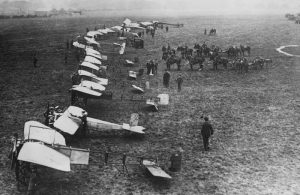 Weapons of warfare have changed over the years, but one of the strangest fighting systems was during World War I, when the planes were not as sophisticated as planes are today. They were slow and at that time, they did not have the guns attached to the planes. Of course they were usually two-seaters, so unlike the World War II planes that had a pilot exclusively assigned to fly the plane, both occupants of the plane had to shoot, or they would be shot down. That was how war was. Kill or be killed.
Weapons of warfare have changed over the years, but one of the strangest fighting systems was during World War I, when the planes were not as sophisticated as planes are today. They were slow and at that time, they did not have the guns attached to the planes. Of course they were usually two-seaters, so unlike the World War II planes that had a pilot exclusively assigned to fly the plane, both occupants of the plane had to shoot, or they would be shot down. That was how war was. Kill or be killed.
The problem of not having guns attached to the plane was really one of control. There was the problem of controlling the plane with shots being fired all around you and no protection in the open cockpit. Then there was controlling the guns in the wind of flight. Not to mention the shots being fired at the open cockpit. The guns the soldiers had on these early planes were carbines and pistols…to take down a war plane…yikes. Of course, there 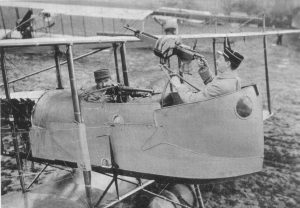 were other problems too. Trying to shoot at the enemy from the cockpit of the plane, the soldier had to be careful not to shoot off the propeller. That would definitely be problematic.
were other problems too. Trying to shoot at the enemy from the cockpit of the plane, the soldier had to be careful not to shoot off the propeller. That would definitely be problematic.
Really, I can’t imagine being a pilot in that war era. You would really be taking your life in your own hands…even more so than the men who flew in later eras, who were also in grave danger, but maybe a little less so. Imagine being the co-pilot in the plane when your pilot is waving his gun around trying to hit the planes flying around you. If the soldier shooting could shoot off the propeller, they could just as easily shoot the other occupant of the plane. I suppose that the pilots fighting in World War I would say that they were just doing their duty, but it seems to me that their “duty” took great courage. Of course, any soldier, no matter what their duty, does their duty, and it always takes great courage. Any soldier 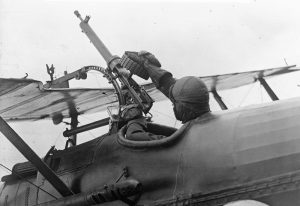 must exhibit great courage in battle. There is no way to go into battle and not be concerned for your safety. And thankfully, as time goes on, weapons of warfare are getting more advanced at being effective, while protecting the soldier in the fight.
must exhibit great courage in battle. There is no way to go into battle and not be concerned for your safety. And thankfully, as time goes on, weapons of warfare are getting more advanced at being effective, while protecting the soldier in the fight.
Of course, those old biplanes had some advantages too. The open cockpit design allowed for easy spying. They could also see the enemy better, and it was easier to drop bombs in those planes, but the later planes made for easier shooting with the attached gun, multiple guns, and the nose guns of the men below the pilots. I’m thankful for the many improvements that have made it easier for our soldiers to come home alive.
 The United States is a great nation, but it would be very hard for a nation to remain great, if that nation did not have a strong military. These days, national security is not guaranteed. That makes our military men and women absolutely essential. All too often, I don’t think we give our veterans the respect and recognition they deserve.
The United States is a great nation, but it would be very hard for a nation to remain great, if that nation did not have a strong military. These days, national security is not guaranteed. That makes our military men and women absolutely essential. All too often, I don’t think we give our veterans the respect and recognition they deserve.
Veterans and soldiers are unique characters. Most of us are not interested in running off to some other country at the drop of a hat to defend people we don’t even know. Nevertheless, when a people are being oppressed, it is a soldier who is called to defend them. These soldiers leave their homes and families, often for months at a time, and go off to another country to defend strangers. They miss births, first steps, school plays, graduations, and so much more. They miss tucking their children in at night,  dropping them off at school in the morning, watching their sporting events, and having weekend barbecues, just to name a few. By the time they have left the military, their children are often mostly grown up. It is time they can never get back, and yet they consider it time well spent, because they did their duty and they saved lives. What more could we ask of them?
dropping them off at school in the morning, watching their sporting events, and having weekend barbecues, just to name a few. By the time they have left the military, their children are often mostly grown up. It is time they can never get back, and yet they consider it time well spent, because they did their duty and they saved lives. What more could we ask of them?
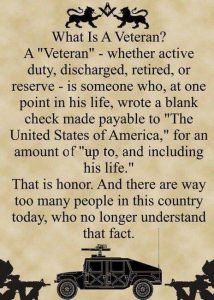 Veterans Day is a day when we honor those who served and upon their discharge, came back home. In this case, while it does honor veterans who have gone to their Heavenly home, it is not about those killed in action. Theirs is a different day…Memorial Day, the day we remember those lost in battle. All of these men and women served their country and the world, but a veteran came home and lived out their life…hopefully with all their limbs attached, but many times that was not to be either. Those veterans, and those with PTSD need our help badly, but all veterans, no matter what the outcome of their service was, deserve our complete and total respect. Veterans Day began on November 11, 1919, making this year the 101st anniversary of that date. To all those among us who served, thank you for your service, and to those veterans who have gone home, including my dad, Allen Spencer and many family members, I thank you!! Happy Veterans Day.
Veterans Day is a day when we honor those who served and upon their discharge, came back home. In this case, while it does honor veterans who have gone to their Heavenly home, it is not about those killed in action. Theirs is a different day…Memorial Day, the day we remember those lost in battle. All of these men and women served their country and the world, but a veteran came home and lived out their life…hopefully with all their limbs attached, but many times that was not to be either. Those veterans, and those with PTSD need our help badly, but all veterans, no matter what the outcome of their service was, deserve our complete and total respect. Veterans Day began on November 11, 1919, making this year the 101st anniversary of that date. To all those among us who served, thank you for your service, and to those veterans who have gone home, including my dad, Allen Spencer and many family members, I thank you!! Happy Veterans Day.
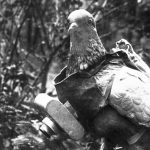 When we think of war, we think mostly of battle, but we should also think of the spies that gather intel. Most often, spies are men and women who have been carefully trained to avoid the enemy, and very possibly to live among the enemy without being detected, so they can hear the plans of the enemy and pass the information to the intelligence community, so it can be used against the enemy so as to win the war. There is, however, another kind of spy that has long been used in war, and was used especially during World War I and World War II…the pigeon. Now this is a spy I would have never have imagined.
When we think of war, we think mostly of battle, but we should also think of the spies that gather intel. Most often, spies are men and women who have been carefully trained to avoid the enemy, and very possibly to live among the enemy without being detected, so they can hear the plans of the enemy and pass the information to the intelligence community, so it can be used against the enemy so as to win the war. There is, however, another kind of spy that has long been used in war, and was used especially during World War I and World War II…the pigeon. Now this is a spy I would have never have imagined.
The reason pigeons caught the attention of the military was that they were trained to fly home…from wherever they were dropped off. I have no idea how they can do that, but they can and do. The spy pigeons went in as Operation Columba, during some of the bloodiest years of World War II. The idea was to drop cages attached to parachutes into the occupied areas of France, with the hope that the people and resistance members, as well as soldiers could attach messages with critical intel on the enemy locations to the pigeons, who would then be sent back to their home base. There, soldiers would be 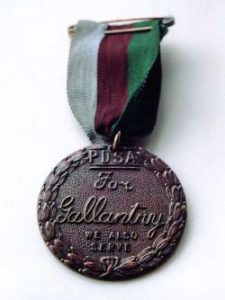 waiting to get the messages to the intelligence community. The plan was perfect, but very risky for the pigeons. So many dangers awaited them…the guns of the enemy, not being found and dying in the cage, and one most of us wouldn’t think of…hungry people. The operation, on its face, was deceptively simple. The British planes dropped 16,000 homing pigeons over occupied Europe during the course of the war, parachuted in small baskets with rice paper, containing a list of questions to be answered by civilians who found them, tucked into canisters tied to their legs. Then the pigeons were to be sent home. Many were lost to the perils in their way, but there were a good number who made it back. A some were decorated with the Dickin Medal for their service…32 pigeons in all were awarded the medal. Pigeon Soldiers like “Winkie” (1943), “Commando” (1944), “Paddy” (1944), “William of Orange” (1944), Mary of Exeter (1945), “G.I. Joe” (1946), Gustav (1944), and Beach Comber (1944), just to name a few. The homing pigeons were donated by their owners…no small sacrifice when you consider that so many lost their lives during the operation. Still, like their human counterparts, the pigeons did their duty, and made their owners proud.
waiting to get the messages to the intelligence community. The plan was perfect, but very risky for the pigeons. So many dangers awaited them…the guns of the enemy, not being found and dying in the cage, and one most of us wouldn’t think of…hungry people. The operation, on its face, was deceptively simple. The British planes dropped 16,000 homing pigeons over occupied Europe during the course of the war, parachuted in small baskets with rice paper, containing a list of questions to be answered by civilians who found them, tucked into canisters tied to their legs. Then the pigeons were to be sent home. Many were lost to the perils in their way, but there were a good number who made it back. A some were decorated with the Dickin Medal for their service…32 pigeons in all were awarded the medal. Pigeon Soldiers like “Winkie” (1943), “Commando” (1944), “Paddy” (1944), “William of Orange” (1944), Mary of Exeter (1945), “G.I. Joe” (1946), Gustav (1944), and Beach Comber (1944), just to name a few. The homing pigeons were donated by their owners…no small sacrifice when you consider that so many lost their lives during the operation. Still, like their human counterparts, the pigeons did their duty, and made their owners proud.
The pigeons did other work, besides just delivering messages. The military equipped some with tiny cameras and they pigeons took reconnaissance photos as they flew back to their home base. The military didn’t have drones in those days, and planes flying “low and slow” would surly be shot down, so the pigeons served as 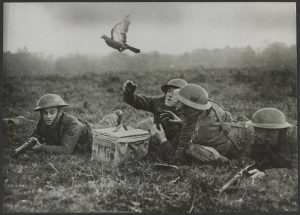 drones in their day too. Most of us think of homing pigeons as being a hobby, and I suppose it started out as that for most of the handlers, but then they grew to love their pigeons…just like family. Each loss was felt deeply, and each successful return met with great relief. They were proud of their very special soldiers, and we as a nation should be too. It gives me a whole new view of pigeons, which I have always enjoyed watching whenever I am in downtown Casper, where we have a beautiful flock of them that grace the skies above town…dipping and soaring high above the buildings, as if in play, but we should remember that at any time, they could be called upon to serve in a different capacity, if the need arose.
drones in their day too. Most of us think of homing pigeons as being a hobby, and I suppose it started out as that for most of the handlers, but then they grew to love their pigeons…just like family. Each loss was felt deeply, and each successful return met with great relief. They were proud of their very special soldiers, and we as a nation should be too. It gives me a whole new view of pigeons, which I have always enjoyed watching whenever I am in downtown Casper, where we have a beautiful flock of them that grace the skies above town…dipping and soaring high above the buildings, as if in play, but we should remember that at any time, they could be called upon to serve in a different capacity, if the need arose.
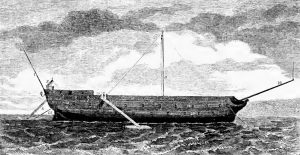 I am sometimes amazed at the ability of humans to be heinously cruel to other human beings. From murders, to slave owners, to prisons or prisoner of war camps, man has the ability to act out evil in its purest form. Still, one would not have expected such evil in the American Revolutionary War era. Well, one would be wrong. We all know that war is a horrific event, but worse than losing life and limb in battle, seems to be the fate faced by those who are captured by the enemy forces, only to be tortured and even killed.
I am sometimes amazed at the ability of humans to be heinously cruel to other human beings. From murders, to slave owners, to prisons or prisoner of war camps, man has the ability to act out evil in its purest form. Still, one would not have expected such evil in the American Revolutionary War era. Well, one would be wrong. We all know that war is a horrific event, but worse than losing life and limb in battle, seems to be the fate faced by those who are captured by the enemy forces, only to be tortured and even killed.
During the Revolutionary War, being captured by the British often meant being sent to a prison ship, the worse of which was the HMS Jersey. Over the years of the war, approximately 11,000 prisoners of war perished on the HMS Jersey. The number of American field casualties during that war was approximately 4,500. That is a stunning difference. The HMS Jersey often held thousands of prisoners at one time, in quarters that were so close, that it could be likened to being packed in like sardines in a tin. There was no light, no medical care, barely any oxygen, and very little in the way of food and clean water. The guards on the prison ships were not concerned with keeping their prisoners alive, and HMS Jersey was the worst of them all.
The little food the prisoners were given was moldy, putrefied, and worm infested. The prisoners had to choose daily to eat the horrible food, or starve. One prisoner Ebenezer Fox, who survived said, “The bread was mostly mouldy, and filled with worms. It required considerable rapping upon the deck, before these worms could be dislodged from their lurking places in a biscuit. As for the pork, we were cheated out of it more than half the time, and when it was obtained one would have judged from its motley hues, exhibiting the consistence and appearance of variegated soap, that it was the flesh of the porpoise or sea hog, and had been an inhabitant of the ocean, rather than a sty. The provisions were generally damaged, and from the imperfect manner in which they were cooked were about as indigestible as grape shot.” That pretty much says it all, I would say. The British soldiers were seemingly unaffected by the image of prisoners banging their biscuits against the deck to remove worms, because this treatment continued throughout the conflict.
Because the prisoners were kept at sea, the smell of a piece of dirt from the shoes of a soldier back from shore leave became one of the prisoners’ greatest delights. I guess that one can always find some good, even in the worst situations, if one looks for it. Captain Dring, a survivor who wrote prolifically about his experiences on the Jersey, recalled one particularly strange consolation. When someone died on the ship, their remains were usually thrown overboard, but occasionally they were allowed to be taken ashore and laid to rest. Dring was part of a group that was tasked with digging graves on land. The men chosen for this duty were ecstatic to be on land again. Dring even took off his boots simply to feel the earth underneath his feet. However, when the crew came across a piece of broken-up turf, they did something extraordinary: “We went by a small patch of turf, some pieces of which we tore up from the earth, and obtained permission to carry them on board for our comrades to smell them. Circumstances like these may appear trifling to the careless reader; but let him be assured that they were far from being trifles to men situated as we had been. Sadly did we approach and reenter our foul and disgusting place of confinement. The pieces of turf which we carried on board were sought for by our fellow prisoners, with the greatest avidity, every fragment being passed by them from hand to hand, and its smell inhaled as if it had been a fragrant rose.”
The known fate of the men on board the prison ships, and especially HMS Jersey was a slow and painful death. Most knew better than to expect to survive their ordeal. They had seen too many of their comrades die right before their eyes, to have much hope that they could make it out. To make mattes worse, the majority of the prisoners aboard the Jersey were young, inexperienced farmhands, not hardened soldiers with survival experience. Only a few of Washington’s army were soldiers with any 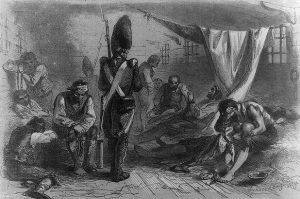 experience. The rest were provincial people, and many had never traveled beyond the limits of the small county where they lived. Imagine the horror of war, and then the conditions on HMS Jersey to the young, innocent men. The constant punishment, meager rations, lack of light, and lack of privacy could be tolerated, but the inactivity and helplessness most likely added depression and despair to their suffering. Times were different then, and there were things that were not available, but many of the things the prisoners suffered could have been avoided, especially the overcrowding and unsanitary conditions, but apparently they just didn’t care.
experience. The rest were provincial people, and many had never traveled beyond the limits of the small county where they lived. Imagine the horror of war, and then the conditions on HMS Jersey to the young, innocent men. The constant punishment, meager rations, lack of light, and lack of privacy could be tolerated, but the inactivity and helplessness most likely added depression and despair to their suffering. Times were different then, and there were things that were not available, but many of the things the prisoners suffered could have been avoided, especially the overcrowding and unsanitary conditions, but apparently they just didn’t care.
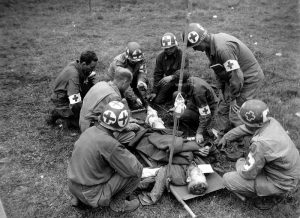 Wearing a white armband with the red cross signifying that a soldier is a medic, did not guarantee their safety in combat. Bombs raining down from the sky could not distinguish the target as a medic when they fell, nor could bullets shot from the guns of the enemy. Nevertheless, they ran into the line of fire at the cry of, “Medic!!” Of course, they were scared. They knew that, at that moment, their life expectancy was about one minute. They had to dodge the bullets and bombs just to do their job. Most of us can’t imagine the fear they must have felt. Still, in that moment, they were the only thing standing between the wounded soldiers and certain death. Soldiers were stunned to see a medic running through the machine gun fire just to put a tourniquet on the battered arm of the wounded soldier. The medic risked his own life to save the lives of others.
Wearing a white armband with the red cross signifying that a soldier is a medic, did not guarantee their safety in combat. Bombs raining down from the sky could not distinguish the target as a medic when they fell, nor could bullets shot from the guns of the enemy. Nevertheless, they ran into the line of fire at the cry of, “Medic!!” Of course, they were scared. They knew that, at that moment, their life expectancy was about one minute. They had to dodge the bullets and bombs just to do their job. Most of us can’t imagine the fear they must have felt. Still, in that moment, they were the only thing standing between the wounded soldiers and certain death. Soldiers were stunned to see a medic running through the machine gun fire just to put a tourniquet on the battered arm of the wounded soldier. The medic risked his own life to save the lives of others.
The medics received the same combat training as the other infantrymen, but they didn’t carry a weapon. Imagine finding yourself in the middle of a war zone and all you have with you is a first aid kit. The idea, I’m sure, is that the soldiers will protect the medics, but can they really. The soldiers are fighting for their own lives. It’s not that they don’t want to protect the medics or their fellow soldiers, but rather that they can’t. They are too busy fighting off the enemy.
Often the men who went in as medics were volunteer conscientious objectors. I don’t know if they realized that a conscientious objector didn’t get out of the war, but rather just didn’t get a gun…for shooting or for protection. Something like that would make me reconsider conscientious objection. I’m not one that wants to kill people, but self defense is another thing entirely. When medics went through their training, the other soldiers were rather negative toward them, often calling them “pill pushers,” but all their disdain disappeared when they saw the medics in action on the battlefield. The medics were right there beside the soldiers in the 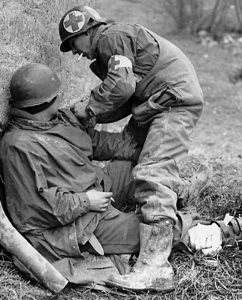 foxholes. They were with them as they advanced during offensives. Then, while the fighting raged, they went between lines attending to the wounded. They disregarded the danger to themselves, and did their duty. The tools of their trade were limited. Often their examination would be followed with a tourniquet and a morphine injection, before cleaning the wound and sprinkling sulfa powder on it. Then they bandaged the wound and dragged the wounded soldier off the field…all in a matter of minutes or less.
foxholes. They were with them as they advanced during offensives. Then, while the fighting raged, they went between lines attending to the wounded. They disregarded the danger to themselves, and did their duty. The tools of their trade were limited. Often their examination would be followed with a tourniquet and a morphine injection, before cleaning the wound and sprinkling sulfa powder on it. Then they bandaged the wound and dragged the wounded soldier off the field…all in a matter of minutes or less.
Medics were protected by the Geneva Convention, but the Red Cross that was displayed on their helmet, was a practice that was abandoned during the Vietnam War. Believe it or not, the cross on the helmet became a target for the enemy. By then, medics also had weapons…just for protection, but my guess is that they were probably glad they had it, but not so in World War II. Armed or not, many were severely injured or killed while attending to the wounded, and that made them a unique kind of hero.

